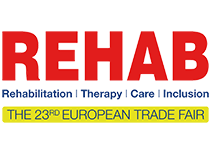“Conditions and symptoms in paediatric rehabilitation are so diverse that evidence-based scientific studies are virtually impossible”
Dr Kristina Müller conducts research in the field of paediatric therapy. At the CON.THERA therapist congress, she will give a lecture on this topic. Nevertheless, she says that evidence-based research is not really possible in her field.
“Evidence-based paediatric therapy is not really possible”, says Dr Kristina Müller. This is because comparable progressions happen too rarely for randomised studies. Despite this, the neuropaediatric specialist has chosen to focus on precisely this topic in her presentation at the CON.THERA interdisciplinary therapy conference taking place alongside REHAB in Karlsruhe. But why?

The renowned child neurologist works at the Mauritius-Therapieklinik near Düsseldorf and has over 23 years of experience with young patients. She believes that science and research have to work together closely: “The criteria for scientific studies may be too strict, but we still rely on pedagogical and other statistical models to prove the effectiveness of our therapies and secure funding.
We can learn a lot from adult neurology here. The brain’s repair mechanisms are not so different in children and we can use the same principles for treatment as we do in adults.”

Müller emphasises the importance of pedagogical insights gained in paediatric therapy. Things like frequent repetition, high training intensity, a supportive environment and the right medication where necessary are the keys to successful rehabilitation. “Repetition is the mother of learning”, she explains, “We can only achieve our goals and help children and young people with neurological conditions achieve their full potential by using the latest therapeutic methods.”
Technologies like virtual reality and artificial intelligence (AI) are easing the rehabilitation process for youngsters by making the many necessary repetitions fun and exciting. This helps the brain learn and pushes it to improve performance. The fun factor is vital here. Robot-supported electronic training equipment boosts motivation, allowing patients to continue their exercises properly at home after leaving the hospital. “But it’s early days yet, there is a very long way to go”, says Dr Müller.
Gait robot relieves therapists
Robotic gait orthoses and other training devices are already relieving therapists so that they can focus on individual patient needs. Sharing neurological knowledge and research results, as well as an evidence-based approach through observation, are also essential parts of training for therapists. That is why the CON.THERA conference is open to all disciplines and professions involved in the therapeutic process. “Although training is becoming much more academic, practical knowledge and the human element are at least just as important in creating gifted therapists.”

Müller is concerned at how funding providers currently treat both rehabilitation treatments and aids when it comes to approval: “The lack of evidence backing up certain therapies and aids is used as an excuse to deny funding. For a long time, the situation in paediatric therapy was good. But now it feels like we have gone back 20 years. Patients are forced to wait for months, if not years, waiting for funding providers to approve treatment and aids.
Sometimes the health insurer will say it is the responsibility of the pension provider or integration support agency, other times it’s the other way round.” At the end of the day, the ones who suffer most are the children and youngsters who have to wait far too long for their treatment. These delays close off important development windows, meaning that patients miss out on recovery opportunities.
Müller also criticises the mountain of bureaucracy involved. She would prefer to spend her time treating patients, rather than filling in forms.
Useful links:
- Presentation of PD Dr Kristina Müller at the CON.THERA conference on Friday 16 June from 2.30 to 3.15 pm
- Information on evidence-based medicine from the German Federal Ministry of Health (in German
- Paediatric rehabilitation at the Mauritius-Therapieklinik in Meerbusch (in German)
- Information for families from the Alliance for Child and Youth Rehabilitation (in German)
- Information and support for aids provision – rehaKIND e.V. _ The International Support Association for Child and Youth Rehabilitation at REHAB in Hall 3, Stand N18 and at www.rehakind.com

